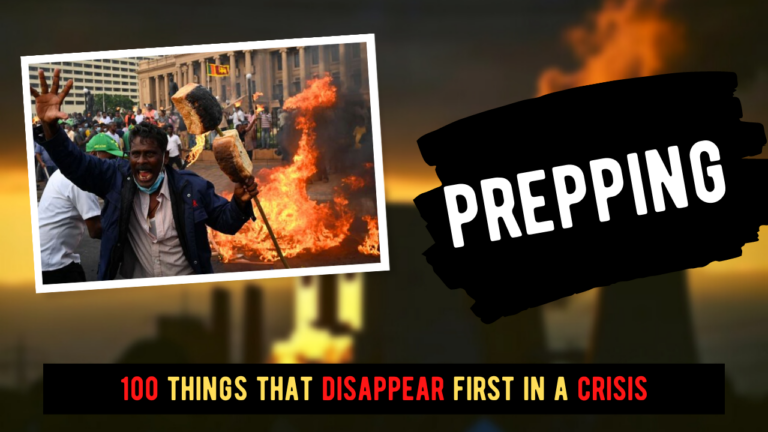When you’re going through a terrible event that can happen in times of war – the death of relatives and friends, hunger and malnutrition, the never-ending cold and frost, fear, sniper attacks – some tips can be helpful.
- Making reservations is useful, but you never know how long problems will last, so stay near renewable sources of food.
- To live near a well with a hand pump is like being in the Garden of Eden.
- After a while, even gold can lose its luster. But in times of war, there is no such luxury as toilet paper. Its surplus value is greater than that of gold.
- If you have to give up comfort, give up electricity. It’s the one that’s the easiest to do without. (Unless you live in a very pleasant climate and you do not need to warm up)
- Canned food is fantastic, especially if it tastes great unheated. One of the best preserves to stock is the gravy sauce, it makes a lot of the dry foods edible that are found in time of war. It only needs a little heat to “warm up” it does not need to be cooked. Plus, it’s cheap, especially if you buy it wholesale.
- Bring books . Those who need an “escape”, things such as novels or riddle stories, become valuable as the war progresses. Surely, it’s good to have a lot of survival guides, but you’ll find out how to cope in most cases anyway. Believe me, you will have a lot of time to waste.
- The feeling of being human can disappear very quickly . I can not tell you how many people I knew who would have exchanged a much needed meal for a little toothpaste, lipstick, soap or perfume . It doesn’t have much use to you if you lose your life. These things cheer up like nothing else.
- Slow burning candles, and matches, a lot of matches.
Apart from that, Crises are often unpredictable and can leave us feeling overwhelmed and uncertain. In the face of a crisis, it can be difficult to prioritize our needs and to know what to focus on first.
To help you prepare, this blog post will explore 100 things that tend to disappear first in a crisis. By understanding what items and resources may not be available during times of turmoil, you can better plan ahead and anticipate your needs.

Knowing what to prepare for and how to create a supply strategy can help you feel secure during difficult times. This blog post will provide insight on the most common items that may become scarce during a crisis, and will offer advice on how to respond if and when these items become unavailable.
- Generators (The good ones are expensive, the storage of fuel is risky, they are noisy, are the target of thieves, and cause maintenance problems, etc …)
- Filters and water purifiers
- Portable toilets
- Dry firewood. To be able to use it, the wood must dry between 6 and 12 months.
- Oil for lamps, wicks, lamps (first, buy clear oil.If this is rare, store everything you find!)
- “Coleman fuel”. We never get too much.
- Weapons, ammunition, tear gas, knives, clubs, bats and slingshots.
- Hand-held can opener, hand-held whips.
- Honey, syrups, white and red sugar.
- Rice, beans, wheat
- Vegetable oil (for cooking). Without oil, food burns / must be boiled, etc.
- Coal, ignition fluid (will become rare suddenly)
- Containers (to be urgently obtained). Any size. For small containers: HARD PLASTIC AND TRANSPARENT ONLY.
- Mini gas heater (otherwise propane will not be able to heat a room)
- Cereal mill (manual)
- Propane bottles (urgent: a real shortage will occur)
- A survival manual
- Baby supplies: diapers, formula, creams, aspirin, etc …
- Washing boards, bucket and dishcloth, with wringer (for laundry)
- Cookers (propane, coleman, and kerosene)
- Vitamins
- Bottle hangers (urgent: without this, the use of small gas cylinders is dangerous)
- Feminine hygiene, hair care and skin care products
- Warm underwear (up and down)
- Hand saws, axes and hatchets, holds (also: oil to sharpen)
- Aluminum food, normal and thick (excellent for cooking and bartering)
- Petrol cans (plastic and metal)
- Garbage bags (we never get enough)
- Toilet paper, Kleenex, paper towels
- Milk, powdered and concentrated (stir the condensed milk every 3 to 4 months)
- Seeds for gardening (non-hybrids), ONE MUST
- Clothespins, clotheslines, hangers, A MUST
- Coleman Pump Repair Kit
- Tuna in oil
- Fire extinguishers (or … a large box of baking soda in each room)
- First aid kit
- Electric batteries (buy the ones with the latest date)
- Garlic, spices and vinegar, cooking appliances
- Big dogs (and a lot of dog food)
- Flour, yeast and salt
- Matches (prefer those that light anywhere). The matches in boxes will leave first.
- Paper, notepads, pencils, solar calculators
- Coolers (convenient for preventing some things from freezing in winter)
- Boots, Belts, Levis Jeans and Solid Shirts
- Electric torches, flashlights, lightsticks , “No. 76 Dietz ” lanterns
- Dashboards, diaries and albums (to take notes, record impressions, relate an experience, historical moments)
- Plastic garbage cans (excellent for storage, water, and transportation if they have wheels)
- Men’s hygiene: shampoo, toothbrushes, toothpaste, mouthwash, dental floss, nail clippers, etc.
- Cast iron cookware (solid, efficient)
- Fishing equipment
- Coils, products, sprays and anti-mosquito creams
- Reinforced adhesive
- Tarps , pegs, string, small and large nails, rope
- candles
- Washing-up liquid
- Backpacks, pack bags
- Garden tools
- Scissors, fabric and sewing material
- Preserved fruits, vegetables, soup, stew, etc …
- Bleach (pure, NOT perfumed: 4 to 6% sodium hypochlorite)
- Canning equipment (jars, lids, wax)
- Knives and sharpening tools: limes, stones, steel
- Bicycles … tires, tubes, pumps, chains, etc …
- Sleeping bags, blankets, pillows, mattresses
- Carbon monoxide alarm (battery operated)
- Board games, playing cards, dice
- Rodenticide, souricide , cockroach
- Mouse, ant and cockroach traps
- Paper plates, cups, utensils (store what you can)
- Baby wipes, oils, soap without water and antibacterial (saves a lot of water)
- Rainwear, rubber boots, etc …
- Shaving equipment: razors, creams, talc, aftershave
- Hand pumps and siphons (for water and fuel)
- Soy sauce, vinegar, broth, gravy, soup
- Reading glasses
- Chocolate, cocoa, tang … ( to improve the taste of water)
- Survival kit
- Clothes, scarves, ear muffs, wool mittens
- Scout Handbook, and Leaders Catalog
- Window Insulation Kit
- Flour biscuits, small crackers, pretzels, dried fruit mix
- Popcorn, peanut butter, walnuts, hazelnuts
- Socks, underwear, T-shirts, etc … (extras)
- Wood (all types)
- Carts and carts (to transport items from one place to another)
- Camp beds and inflatable mattresses
- Gloves for work, cold, gardening, etc …
- Hang lanterns
- Patches for windows, glue, nails, screws, nuts, bolts
- Tea
- Coffee
- cigarettes
- Wine, liqueurs (for bribes and medical care)
- Paraffin
- Glue, nails, nuts, bolts, screws, etc …
- Chewing gum, sweets
- Atomizers (to cool and clean)
- Cotton hats and scarves
- Goats, chickens (fun)
